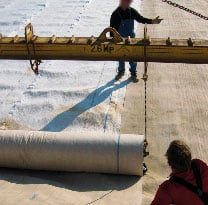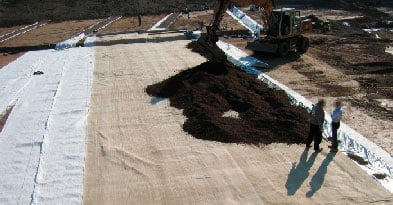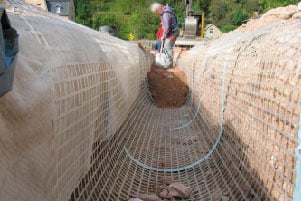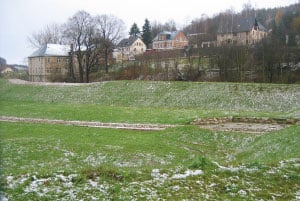Project: Storm water retention pond Ziegenschleppe, Schneeberg/Erzgebirge, Germany
Product: Bentofix® BFG 5000 | Secudrain® 201 WD 601 201 | Secugrid® 200/40 R6 | Secugrid® 60/60 Q6


Fig. 1nstallation of Bentofix with a spreader bar Fig. 2 Cover soil placement over the Bentofix GCL
Challenge
To improve the water retention capacity and the flood protection situation in the tributary to the Zwickauer Mulde after the devastating floods on the Mulde and Elbe in 2002, additional water retention areas were created. In the town of Schneeberg on the Schlema, a storm water retention pond was constructed in 2005 with a utilisation volume of approximately 23,400m3. The main components also included an inlet and two outlets as reinforced-concrete structure, an emergency spillway as a rough ramp, 28m of DN 1400 drainage channel and, in addition, the entire mechanical and electrical equipment of the inlet structure.
Mining was carried out in Schneeberg (Erzgebirge), Germany, for more than 500 years. A particular challenge is that the Ziegenschleppe storm water retention pond had to be built over a former mining gallery due to the restricted spatial conditions. In principle, settlements, subsidence, and ground failures were expected in the area of old mines, which could not be precluded at this location either.
Naue was involved in the design of this project (stability analysis, installation recommendations, selection of geosynthetics), in the supply of the geosynthetics and - in cooperation with the construction company and the responsible consulting engineers - in the accompanying construction work.


Fig. 3 Filling of the anchor trench Fig. 4 Project after completion
Solution
The Naue Group‘s application engineering department, BBG Bauberatung Geokunststoffe, recommended the following structure for the storm water retention pond in the area of the existing ground:
Approx. 3,000m2 of an uniaxial polyester (PET) geogrid Secugrid® were installed as a base reinforcement in the area of the collapse endangered gallery “Fürstenstollen”. The fracture width here was 1.50m, and the anchorage length was 15m in the horizontal direction. The installation was carried out up to approximately 5m into the slope area directly on the in-situ subgrade. In the case of a full impounding of the basin up to 5.60m, an allowable load duration of 40 days was assumed.
More than 10,000m2 of Secudrain® drainage mats were used to replace a granular drainage layer. Thus, drainage and relief of groundwater and artesian water in the base and slope area could be constructed with the help of a resource-saving as well as an environmentally friendly construction method. The drainage mat was installed underneath the single barrier system Bentofix® geosynthetic clay liner (GCL), which covered the entire basin. The GCL was covered with a 30 - 60cm layer of soil.
The Secudrain® drainage mat was also used in the slope area, which as in the pond base - was installed underneath the Bentofix® GCL. Fo reasons of stability, the GCL was covered with a biaxial PET geogrid Secugrid® (for the slope stabilisation). The area was then covered with a 30 to 60cm thick layer of soil.

